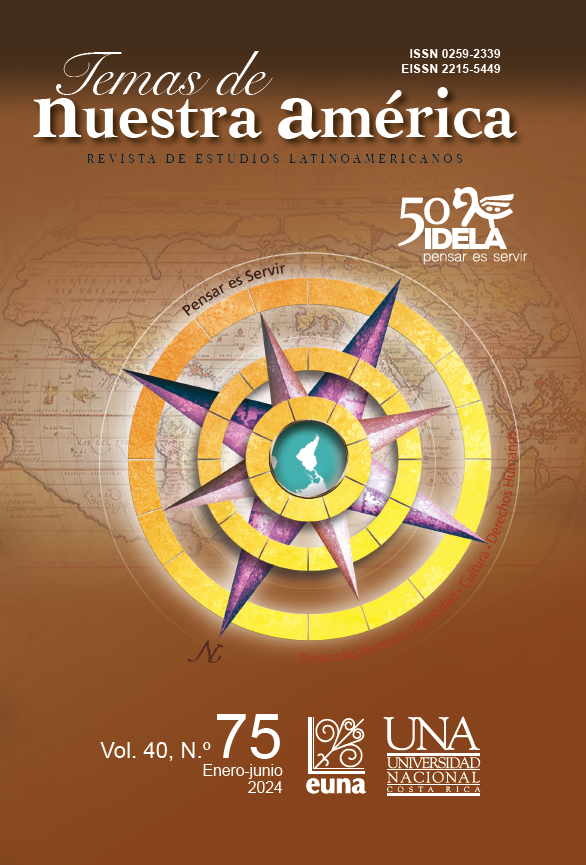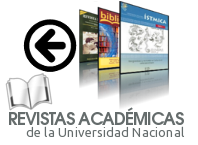Reorientando los lentes para una historia de la teoría del arte en Cuba. ¿Pensamiento cultural en Latinoamérica?
DOI:
https://doi.org/10.15359/tdna.40-75.6Keywords:
cultural thought, Jorge Mañach, Latin American cultural studies, sociology of scientific knowledgeAbstract
The purpose of this article is to investigate the spaces in which emerges, consolidates and socializes the Cultural Thought of one of the most notable intellectuals of the first half of the Cuban twentieth century. It uses the methodological resources of the New Sociology of Scientific Knowledge, from a critical perspective, to examine the life and work of Jorge Mañach (1898-1961), to corroborate this Cultural Thought’s place as scientific knowledge about art and its contribution to cultural studies within the Latin American epistemic horizon. At the same time, the contingent circumstances that allowed its legitimacy are assessed. In order to visualize Jorge Mañach's cultural thought, special consideration is given not only to the analysis of his most representative theoretical texts, but also to his relationship with the cultural institutions and intellectual initiatives to which he was linked.
References
Acha, J. (1993). Las culturas estéticas en América Latina. UNAM.
Altamirano, C. (2010). Élites culturales en el siglo XX latinoamericano. In Historia de los intelectuales en América Latina (Vol. II, pp. 9-28). Katz Editores.
Arcos, J. L. (1999). Pensamiento y estilo en Jorge Mañach. Temas (Número extraordinario 16-17), 205-211.
Arcos, J. L. (2003). Tendencias diversas: J. Mañach, M. Vitier, R. Guerra, E. Roig de Leuchsenring, J. Chación, J. J. Arrom, R. Lazo, S. Bueno, A. Carpentier, J. M. Valdés Rodríguez, L. de Soto. In I. d. L. y. L. J. A. P. Valdor" (Ed.), Historia de la Literatura cubana. La literatura cubana entre 1858-1959. La República (Vol. II, pp. 713-738). Editorial Letras Cubanas.
Arencibia, Y. (2018). Para una teoría del arte en Historia y estilo, de Jorge Mañach. Editorial A Contracorriente.
Barnes, B., y. Shapin, S. (1979). Natural Order: Historical Studies of Scientific Culture. Sage.
Bourdieu, P. (1976). Le champ scientific. Actes de la recherche en sciences sociales (n. 2-3), 88-104.
Cairo, A. (1979). El Grupo Minorista y su tiempo. Ciencias Sociales.
Cairo, A. (1989). Letras. Cultura en Cuba. Pueblo y Educación.
Díaz, D. (2003). Mañach o la República. Editorial Letras Cubanas.
García Canclini, N. (1984). La producción simbólica. Teoría y método en sociología del arte. Siglo XXI Editores.
Instituto de Literatura y Lingüística. (2003). Historia de la Literatura cubana (Vol. II). Editorial Letras Cubanas.
Khun, T. S. ([1962] 1977). La estructura de las revoluciones científicas. F. C. E.
Kreimer, P. (2008). Sociología del Conocimiento. In C. Altamirano (Ed.), Términos críticos de la sociología de la cultura. Paidós.
Manzoni, C. (2001). Un dilema cubano: nacionalismo y vanguardia. Fondo Editorial Casa de las Américas.
Merino, L. (2015). Espacios críticos habaneros del arte cubano: la década de 1950 (s. y. prólogo), Ed. Ediciones Unión, Editorial UH.
Muñoz, T., y Hernández., A. (2012). Dos extremos metodológicos y una historia de las ideas sociológicas en Cuba. In T., y G. V. Muñoz Gutiérrez, Clarisbel (Ed.), La Sociología del Conocimiento. Selección de lecturas (Vol. I, pp. 387-392). Editorial Félix Varela.
Muñoz, T., y Gómez., C (Comp.). (2013). La Sociología del Conocimiento. Selección de lecturas. Editorial Universitaria Félix Varela.
Ocampo, E., y. Perán. M. (1991). Teorías del arte. Icaria Editorial.
Salermo Izquierdo, J. (2000). Fernando Ortiz, notas acerca de su imaginación sociológica. Centro de Investigación y Desarrollo de la Cultura Cubana Juan Marinello.
Downloads
Published
How to Cite
Issue
Section
License
Copyright (c) 2024 Temas de Nuestra América Revista de Estudios Latinoamericanos

This work is licensed under a Creative Commons Attribution-NonCommercial-NoDerivatives 4.0 International License.
Esta obra de Revista Temas de Nuestra América está bajo una Licencia Creative Commons Atribución-NoComercial-SinDerivar 4.0 Internacional.
Cualquier permiso que trascienda dicha licencia, debe solicitarse por escrito a la persona directora de la Revista










